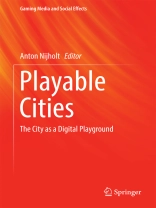This book addresses the topic of playable cities, which use the ‘smartness’ of digital cities to offer their citizens playful events and activities. The contributions presented here examine various aspects of playable cities, including developments in pervasive and urban games, the use of urban data to design games and playful applications, architecture design and playability, and mischief and humor in playable cities.
The smartness of digital cities can be found in the sensors and actuators that are embedded in their environment. This smartness allows them to monitor, anticipate and support our activities and increases the efficiency of the cities and our activities. These urban smart technologies can offer citizens playful interactions with streets, buildings, street furniture, traffic, public art and entertainment, large public displays and public events.
Содержание
Introduction to Playable Cities.- Creative Tourism, Social Tourism and Playful Smart Cities.- Playful Urban Interventions.- Game Engine in Urban Planning and Citizen Participation.- Thirdplaceness.- Mischief Humor in Playable Cities.- Digital Cartography for Playable Cities.- Development of Pervasive Games.- Urban Game: Operation Noose.- Engaging with the City through Urban Data Games.- Experimentation and Playfulness.
Об авторе
Anton Nijholt studied mathematics and computer science at the Technical University of Delft, the Netherlands and received a Ph.D. degree in theoretical computer science from the Vrije Universiteit, Amsterdam, The Netherlands, in 1980. He is a Professor of Computer Science in the Human Media Interaction group, University of Twente, Enschede, The Netherlands. He held positions at various universities in and outside The Netherlands.
His main research interests are entertainment computing, multimodal interaction, affective computing, and brain–computer interfacing. He has hundreds of scientific publications, including (edited) books on the history of computing, language processing, and brain–computer interfacing. Recently he edited three books: “Playful User Interfaces”, “More Playful User Interfaces” and “Entertaining the Whole World”, all with Springer. He has been a guest-editor for Journal on Multimodal User Interfaces, International Journal of Arts and Technology, Entertainment Computing, International Journal of Creative Interfaces and Computer Graphics (IJCICG) and the Brain-Computer Interfaces journal.
Presently, he is editing a section on Brain-computer Interaction and Games in a Springer Handbook on Digital Games and Entertainment. Professor Nijholt is also Specialty Chief Editor of Frontiers in Human-Media Interaction and (associate) editor of several other journals. He has also served as Program Chair and General Chair for the main international conferences on affective computing, multimodal interaction, virtual agents, and entertainment computing.












